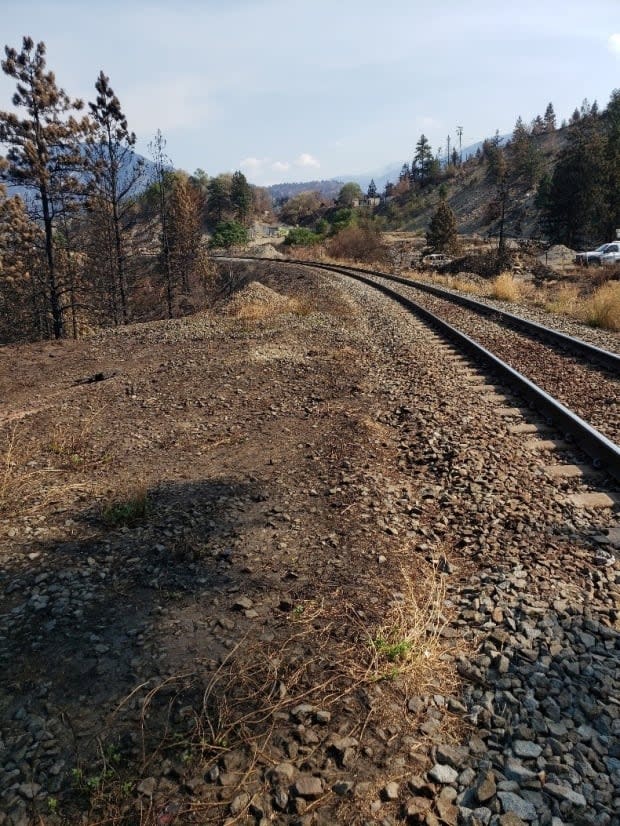Lytton residents cast doubt on TSB finding train not linked to catastrophic fire

Some of Lytton's residents say they don't accept a Transportation Safety Board finding that railway activity played no part in igniting a fire that devastated the town in late June and they're disappointed the community was not consulted during the four-month-long investigation.
On June 30, 2021, hundreds of people living in and around the village of Lytton, located in the Fraser Canyon northeast of Vancouver, were forced to flee as the fire raced through the community.
Smoke and flames, spread by extreme wind and blistering heat consumed the village in one of the most destructive fires in recent B.C. history. Two people died and 90 per cent of the buildings in town were destroyed.
The TSB findings released on Thursday found that a train passed through town 18 minutes before the fire was reported, and that the ignition point for the fire was less than two metres from the centre of the CN Rail track west of the downtown core.
But the report concluded there was no evidence to prove the trains were responsible for the catastrophic fire.
Lytton resident Alfred Higginbottom of the Skuppah First Nation said the report failed to provide accountability and earn the trust of the community.
"Nobody is really going to accept that finding at all, in my view anyways, and from numerous people that I have talked to — they don't accept it either. It's not only me. It's the community and the population around here in general," he said, adding the community members who have been spread out across the province since the fire should have been consulted.
"First off is involving the community and the people in the process so they understand the process and have a clear understanding — not just give results four months later."
Lytton residents not interviewed
TSB investigators said they found no signs of hot bearings, burned brakes or other potential fire-creating problems in the train and simulations to test the train as though it were fully loaded didn't find any "sparking." They also examined video evidence and data recordings collected on the trains and interviewed railway employees.
But TSB investigators said in a media briefing that they didn't interview Lytton residents, some of whom claim they witnessed the fire's ignition.
WATCH | Residents speculated in July a train caused the fire:
Lytton First Nation Chief Janet Webster said she was "disappointed" by the report and the failure to interview village residents — and that she worried the TSB findings could have been affected by other, concurrent investigations that took place in early July.
"I feel it wasn't a thorough investigation. The Transportation [Safety] Board came in nine days after the fire and a lot of stuff was rifled through — CN [Rail] came in and did theirs, RCMP did their investigation, and the B.C. Wildfire Service did their investigation prior to Transportation [Safety] Board," she said.
"I feel they didn't interview everyone that may have witnessed the fire — we do have some people who took pictures during the fire, videos during the fire ... We need to see those other reports from the RCMP and [B.C. Wildfire Service] and I'm hoping that everyone's honest in those reports."
Town has PTSD, resident says
The Thompson-Nicola Regional District and the Lytton First Nation have both said they believe a train was responsible for the fire.
One resident filed a proposed class-action lawsuit in August on behalf of those who lost their homes or businesses in the village, claiming the fire was caused by heat or sparks from a train. The lawyer on the case said weather conditions, the train schedule, eyewitness accounts and the burn pattern near the rail tracks all lead them to believe the fire was caused by trains.

Harvey Dunstan, who said he passed through town minutes before it became engulfed in flames, said he found the report hard to believe and that rumours and anxiety around trains remain a focus of town residents.
"There have been a lot of people who see the brakes or the axle glowing red at night," he said. "I try not to look at the buildings because so many memories come back."
Higginbottom said he believes much of the town continues to suffer from post-traumatic stress from the trains that continue to pass by the town daily.
"When you hear a train, and you hear the rumble, the first thing that comes to mind is the fire," he said.
The TSB said it would reopen its investigation if "compelling" new evidence comes forward, but would not elaborate on what kind of evidence would meet that bar.
The B.C. Wildfire Service is still continuing its own investigation. The RCMP is also working to determine whether any criminal activity led to the fire, but said Thursday it couldn't estimate how much longer that investigation will take.


